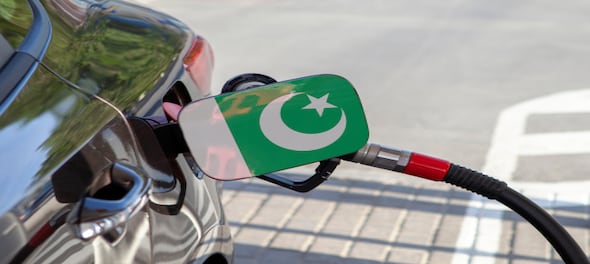
Pakistan increased petrol and gas prices to a historic high late on Wednesday to appease the International Monetary Fund (IMF) for an early release of the $1.1 billion loan tranche of the $6.5 billion bailout deal. The new prices will come into effect from 12 am Thursday.
Petrol price was hiked by PKR 22.20 to up to PKR 272 per litre (INR 1 equals PKR 3.21), Geo News reported citing a release from the Finance Division. The price of high-speed diesel increased to PKR 280 per litre after a hike of PKR 17.20. Kerosene oil will now be sold at PKR 202.73 per litre and light diesel oil will be available at PKR 196.68 per litre after an increase of PKR 12.90 and PKR 9.68, respectively.
The press release cited the PKR's devaluation against the dollar as the reason for the "historic" surge.
The Pakistan government has been struggling to reach an agreement with the IMF. It sees IMF funds as a bailout for the economic crisis it is dealing with right now. However, a Moody's economist said the IMF bailout alone is unlikely to put the economy back on track.
Pakistan and IMF officials held 10 days of marathon talks in Islamabad, from January 31 to February 9, but could not reach a deal as the fund demanded prior actions before signing any agreement to release $1.1 billion out of the $7 billion deal agreed in 2019.
Also read | Inflation in Pakistan may average 33% till June
Pakistani and IMF officials are now holding talks in virtual settings to finalise a deal to provide the much-needed funds to shore up the foreign exchange that dropped to below $3 billion this month.
The increase in the price of petroleum products was one of the preconditions of the Washington-based lender, which will lead to a hike in the already record-high inflation, coupled with the new fiscal measures undertaken through the 'mini-budget'.
Meanwhile, inflation is expected to go up in Pakistan after the petrol hike and the 'mini-budget'.
What's the mini-budget?
The cash-strapped Pakistan government introduced a tax-loaded mini-budget — a money bill in parliament on Wednesday to raise Rs 170 billion in taxes by June this year as part of conditions by the IMF. Finance Minister Ishaq Dar presented the Finance (Supplementary) Bill, 2023, in the National Assembly — the lower house — empowered to legislate on money matters.
Also read | Pakistan economic crisis | Prices of essentials such as milk, petrol and meat hit stratosphere
In the finance bill, the rate of general sales tax (GST) was proposed to be increased from 17 percent to 18 percent, according to CNN-News18. The government also proposed to raise taxes on luxury items to 25 percent. The mini-budget also mentioned raising federal excise duty on cigarettes and sugary beverages, 18% sales tax on perfumes and increasing sales tax on laptops, LED TVs, smartphones and other electronic machinery
The government was forced to bring legislation through the parliament after President Arif Alvi on Tuesday refused to promulgate an ordinance to raise the new taxes and “advised” the finance minister to take parliament into confidence over the Rs 170 billion taxes, PTI reported.
The Cabinet, however, met after the president's "refusal" and approved the bill later in the evening after a debate. It also summoned the parliament to meet in an emergency session and pass the new bill.
Through the "mini-budget", the Pakistan Democratic Movement (PDM)-led federal government aims to reduce the budget deficit and broaden its tax collection net.
The Federal Board of Revenue (FBR) has issued an SRO, increasing the standard 17 per cent general sales tax (GST) to 18 per cent, for collecting taxes worth Rs 115 billion, while the remaining Rs 55 billion will be generated through other measures in connection with the Finance (Supplementary) Bill 2023 — or the 'mini-budget,' reported Geo News.
Check out our in-depth Market Coverage, Business News & get real-time Stock Market Updates on CNBC-TV18. Also, Watch our channels CNBC-TV18, CNBC Awaaz and CNBC Bajar Live on-the-go!


'Rahul Gandhi deserted Amethi due to fear of Smriti Irani': How BJP plans to puncture Congress' UP plan
May 3, 2024 1:12 PM
'Don't be scared, don't run away', PM Modi tells Rahul for not contesting from Amethi
May 3, 2024 1:06 PM

